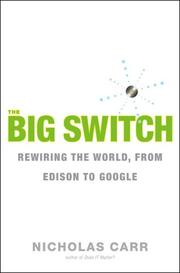| Listing 1 - 7 of 7 |
Sort by
|
Periodical
Year: 2009 Publisher: Auckland, New Zealand : Adrenalin Publishing,
Abstract | Keywords | Export | Availability | Bookmark
 Loading...
Loading...Choose an application
- Reference Manager
- EndNote
- RefWorks (Direct export to RefWorks)
Electrical engineering --- Automation --- Automatic control --- Génie électrique --- Automatisation --- Commande automatique
Book
ISBN: 9782746051041 Year: 2009 Publisher: Saint Herblain Eni
Abstract | Keywords | Export | Availability | Bookmark
 Loading...
Loading...Choose an application
- Reference Manager
- EndNote
- RefWorks (Direct export to RefWorks)
Periodical
Year: 2009 Publisher: Auckland [N.Z.] : Adrenalin Pub.,
Abstract | Keywords | Export | Availability | Bookmark
 Loading...
Loading...Choose an application
- Reference Manager
- EndNote
- RefWorks (Direct export to RefWorks)
Electrical engineering --- Automation --- Automatic control --- Génie électrique --- Automatisation --- Commande automatique --- New Zealand.
Book
ISBN: 9789038214405 Year: 2009 Publisher: Gent Academia press
Abstract | Keywords | Export | Availability | Bookmark
 Loading...
Loading...Choose an application
- Reference Manager
- EndNote
- RefWorks (Direct export to RefWorks)
Automatic factories --- Automatic production --- Automation --- Automatisation --- Automatisering --- Computer control --- Electrical engineering --- Electrotechniek --- Electrotechnique --- Elektrotechniek --- Engineering [Electrical ] --- Engineering cybernetics --- Fabrieken -- Automatisering --- Factories -- Automation --- Genie electrique --- Production automatique --- Systèmes automatisés --- Usines -- Automatisation --- 621.3 --- vermogenelektronica --- Elektrische installaties --- 621.3 Electrical engineering --- elektrotechniek --- Electric engineering --- Génie électrique --- Électrotechnique --- Mathematics
Book
ISBN: 9780521896207 9780511576102 0521896207 Year: 2009 Publisher: Cambridge Cambridge University Press
Abstract | Keywords | Export | Availability | Bookmark
 Loading...
Loading...Choose an application
- Reference Manager
- EndNote
- RefWorks (Direct export to RefWorks)
The internet has the potential to increase the number of cross-border disputes between a wide range of different users. For many internet disputes, the use of Online Dispute Resolution (ODR) becomes critical. ODR uses information technology (such as expert systems) and internet communication applications (such as webforms or web filing platforms) to resolve disputes outside the courts. Although ODR is a progeny of ADR, using some of the same processes such as mediation and arbitration, ODR is also different in that it adds new and transformative technology and processes. This book sets out the process standards with which ODR, and in particular online arbitration, should comply and shows how these standards can be implemented in the real world. It considers applicable law and enforcement, thus providing a blueprint of how online arbitration processes should be devised.
Economic law --- Peaceful settlement of international disputes --- Computer architecture. Operating systems --- United Kingdom --- Electronic commerce --- Dispute resolution (Law) --- Due process of law --- Law and legislation --- Automation --- Due process of law. --- Automation. --- Law and legislation. --- Commerce électronique --- Règlement de conflits --- Application régulière de la loi --- Droit --- Automatisation --- Australie --- Royaume-Uni --- France --- Allemagne --- Hong Kong --- Suède --- Suisse --- Etats-Unis
Book
ISBN: 9789043017091 Year: 2009 Publisher: Amsterdam Pearson Education
Abstract | Keywords | Export | Availability | Bookmark
 Loading...
Loading...Choose an application
- Reference Manager
- EndNote
- RefWorks (Direct export to RefWorks)
webapplicaties (informatica) --- Computer assisted instruction --- e-learning --- web 2.0 --- jeugd --- jeugdcultuur --- web 2.0. --- digitalisering --- internet --- Automatisation Automatisering --- Internet Internet --- Réseaux Netwerken --- Information (gestion) Informatie (management) --- 316.32 --- Internet 2.0 --- Computers --- Informatiesamenleving --- Jeugdcultuur --- Digitale snelweg --- 316.32 Globale samenlevingsvormen --- Globale samenlevingsvormen --- Informatiemaatschappij 002:304 --- Werk --- Kinderen en jeugd --- Cultuursociologie --- Sociologie --- Informatietechnologie --- Communicatiemiddelen --- Informatiemaatschappij --- Kind --- IT --- Communicatiemiddel --- Jeugd --- Media --- Ontwikkelingsstoornis --- Fysiotherapie --- Erfelijkheidsleer --- Stadssamenleving --- Verpleegkunde --- Jongere

ISBN: 9780393062281 9780393333947 0393062287 Year: 2009 Publisher: New York, N.Y. Norton
Abstract | Keywords | Export | Availability | Bookmark
 Loading...
Loading...Choose an application
- Reference Manager
- EndNote
- RefWorks (Direct export to RefWorks)
A hundred years ago, companies stopped producing their own power with steam engines and plugged into the newly built electric grid. The cheap power pumped out by electric utilities not only changed how businesses operated but also brought the modern world into existence. Today a similar revolution is under way. Companies are dismantling their private computer systems and tapping into rich services delivered over the Internet. This time it's computing that's turning into a utility. The shift is already remaking the computer industry, bringing new competitors like Google to the fore and threatening traditional stalwarts like Microsoft and Dell. But the effects will reach much further. Cheap computing will ultimately change society as profoundly as cheap electricity did. Here, business journalist Carr weaves together history, economics, and technology to explain why computing is changing--and what it means for all of us.--From publisher description.
Computers and civilization. --- Information technology --- Technological innovations. --- Internet. --- Social aspects. --- Computers and civilization --- Technological innovations --- Internet --- Social aspects --- Telecommunication technology --- Computer architecture. Operating systems --- #SBIB:309H103 --- #SBIB:309H1713 --- Automatisation Automatisering --- Banques de données Gegevensbanken --- Bases de données Database --- Internet Internet --- Ordinateurs Computers --- Progrès Vooruitgang --- Breakthroughs, Technological --- Innovations, Industrial --- Innovations, Technological --- Technical innovations --- Technological breakthroughs --- Technological change --- Creative ability in technology --- Inventions --- Domestication of technology --- Innovation relay centers --- Research, Industrial --- Technology transfer --- DARPA Internet --- Internet (Computer network) --- Wide area networks (Computer networks) --- World Wide Web --- Civilization and computers --- Civilization --- Mediatechnologie / ICT / digitale media: sociale en culturele aspecten --- Mediatechnologie: nieuwe toepassingen (abonnee-televisie, electronic mail, desk top publishing, virtuele realiteit...) --- Information technology - Social aspects
| Listing 1 - 7 of 7 |
Sort by
|

 Search
Search Feedback
Feedback About UniCat
About UniCat  Help
Help News
News